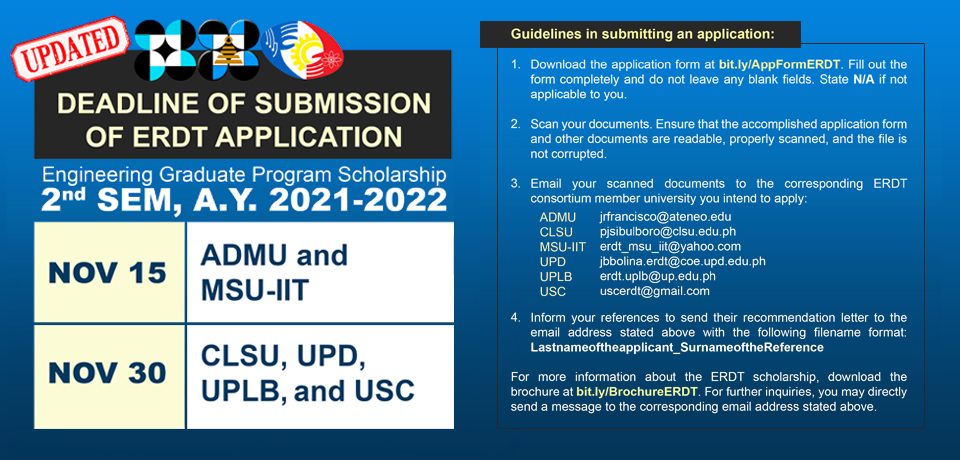6th ERDT Congress
Nuclear Energy Forum:
Considerations and Essential Information
23 August 2017, Manila, Philippines
With the objective of informing the public on the important matters to be addressed and considered before pursuing a national nuclear energy policy that will provide the backbone of the Government’s nuclear power program, the Department of Science and Technology – Engineering Research and Development for Technology (DOST-ERDT), University of the Philippines National Engineering Center (UP NEC), and the Department of Energy (DOE) successfully conducted the Nuclear Energy Forum (NEF): Considerations and Essential Information last 22 August 2017.
Held at the Novotel Manila, Araneta Center, Cubao, Quezon City, the UP Engineering Research and Development Foundation, Inc. (UPERDFI), and DOST’s Philippine Nuclear Research Institute (PNRI), and the Department of Energy’s Nuclear Energy Program Implementation Organization (NEPIO) took active roles in organizing the event.
The Forum was attended by more than 500 participants from international organizations, academe, government, industry, media, and civil society organizations. Faculty members, students and alumni practitioners of the DOST-ERDT Consortium of eight engineering universities formed the majority of the audience whose interests in human resource development in addition to technology are considered important factors in a successful nuclear energy experience.
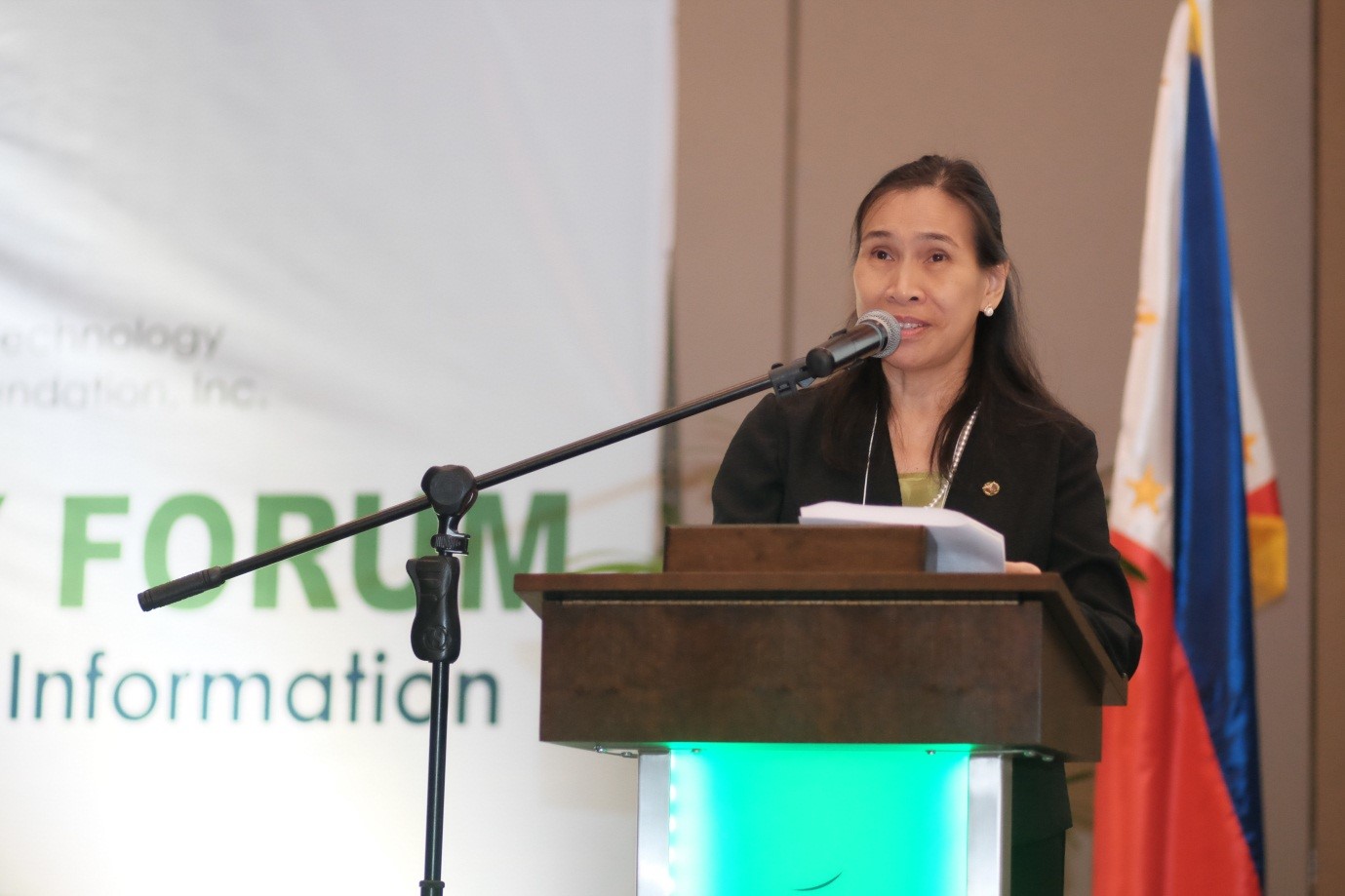
NEF Steering Committee Chairperson Dr. Rizalinda L. de Leon delivering her welcome remarks.
The Forum was opened by Dr. Rizalinda L. de Leon, Dean of the UP College of Engineering, Executive Director of the UP NEC and Program Leader of the DOST-ERDT Consortium for human resource development composed of eight engineering universities - Ateneo de Manila University, Central Luzon State University, De La Salle University, Mapua University, Mindanao State University – Iligan Institute of Technology, University of the Philippines Diliman and Los Baños and University of San Carlos. She emphasized the goals of the activity and invited all the participants to be actively engaged in the discussions and networking with other participants and with the speakers.
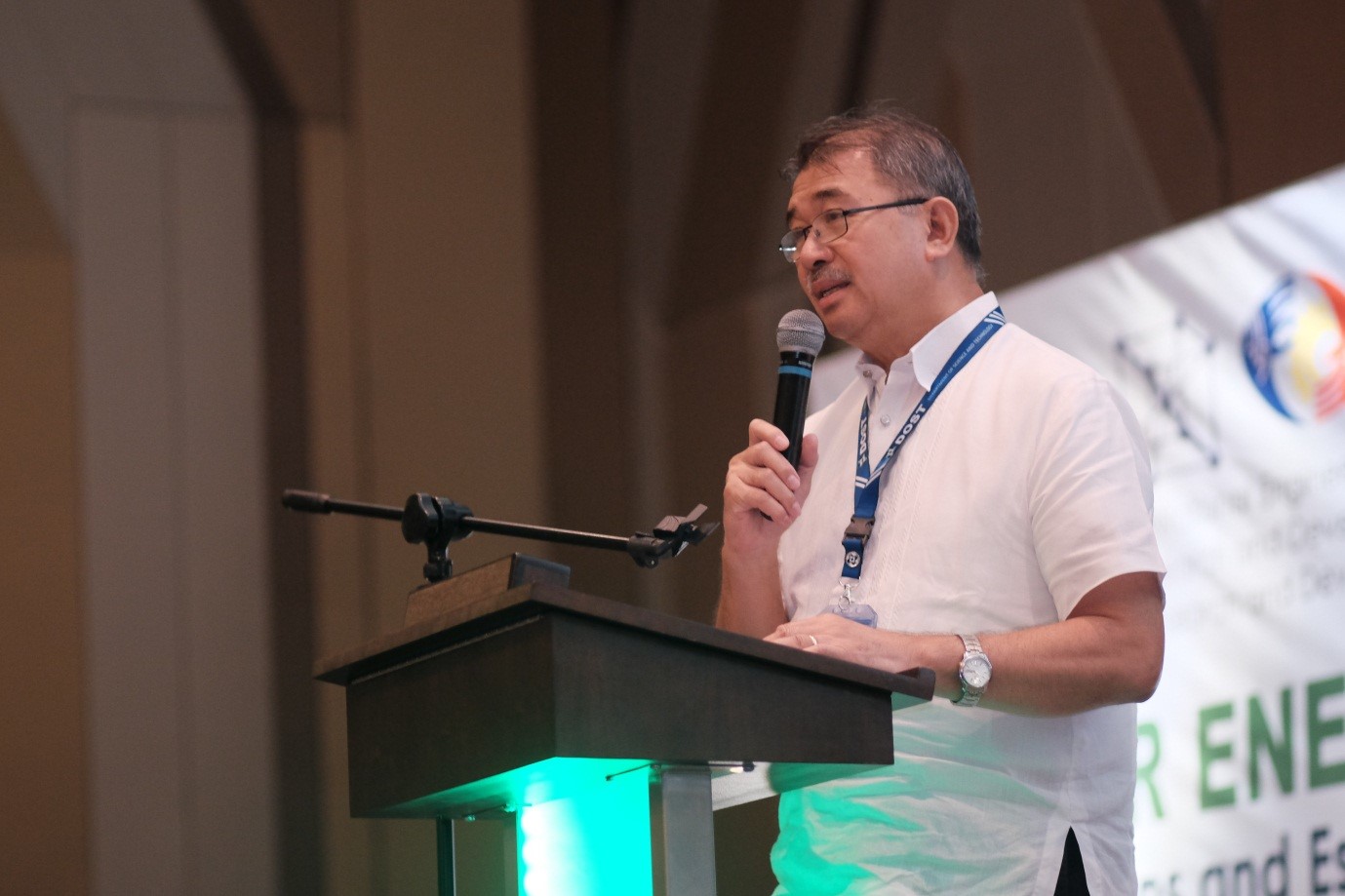 DOST Secretary Fortunato T. de la Peña giving his message to all the participants.
DOST Secretary Fortunato T. de la Peña giving his message to all the participants.
Department of Science and Technology (DOST) Secretary Fortunato T. de la Peña and Department of Energy (DOE) Secretary Alfonso G. Cusi delivered their respective messages. The official message of Sec. Cusi was read by Undersecretary Donato D. Marcos.
Any energy policy has to be grounded on solid science and technology even more so in nuclear energy.
DOST Sec. de la Peña stressed the need to develop a pool of technical talents in the field of nuclear science in order to fully reap its benefits. He said that “Nuclear science and technology has many applications such as health, agriculture, and industry. DOST is committed to research and development, technology transfer, scientific and technological services and human development in these areas. Priority has to be given to the institution of academic programs in nuclear science and technology. We need to develop human resources in the field of nuclear science because of the many applications it has. We want to do our best to meet the demands of human resource development within the next five years.”
Sec. de la Peña further added that "Any energy policy has to be grounded on solid science and technology even more so in nuclear energy. This Forum is an excellent step towards that purpose. Not only experts but various stakeholders such as members of the academe and general public will be able to contribute to the wise exercise of this vision of this administration with regard to a nuclear energy policy. DOST owes it to the Filipino people to remain faithful in its responsibilities in helping to ensure the safety of the public and the environment."
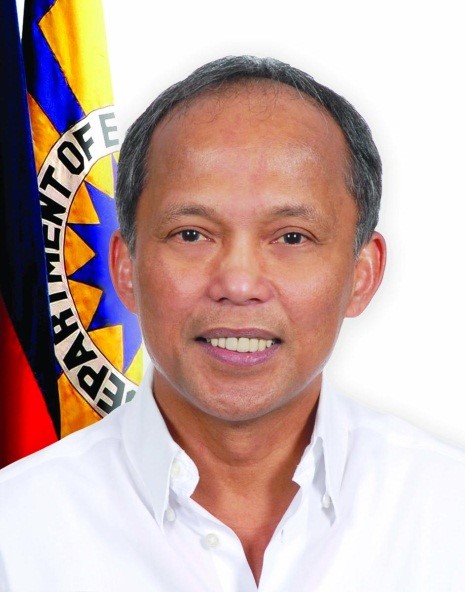 DOE Sec. Alfonso G. Cusi
DOE Sec. Alfonso G. Cusi
DOE Sec. Cusi expressed his gratitude to the organizers of the Forum for helping the Department to continue and advance the discussions surrounding nuclear energy Sec. Cusi said that “this Nuclear Energy Forum is with relevance and it serves as a venue to share knowledge, discuss important issues and technology developments that will equip DOE with science-based information about nuclear energy. With a deeper appreciation of nuclear energy, we will be able to make informed decisions to whether or not to follow the path being taken by some of our ASEAN neighbors that are considering nuclear power in their energy portfolios in the long term. ”
He further added that DOE is committed to ensuring that our energy resources will be able to meet the requirements of an industrialized economy that follows a projected growth path of 6-7% per year and that is also able to provide opportunities for inclusive growth.
DOE has always viewed nuclear energy as a long-term option for power generation that will provide supply security, stability and reliability.
“In the case of the Philippines, the DOE has always viewed nuclear energy as a long-term option for power generation that will provide supply security, stability and reliability. We are cognizant of its technical and economic viability, and its inclusion will inevitably diversify our existing generation mix comprised of coal, natural gas, geothermal, hydropower, oil, wind, biomass and solar. Our recent outlook projection places the contribution of emerging energy technologies, such as nuclear power and liquefied natural gas, at around 1% of total energy supply. The inclusion of these resources is consistent with our vision of achieving a low carbon future anchored on technology-neutral policy that will potentially increase supply reliability and make energy more affordable to consumers.”
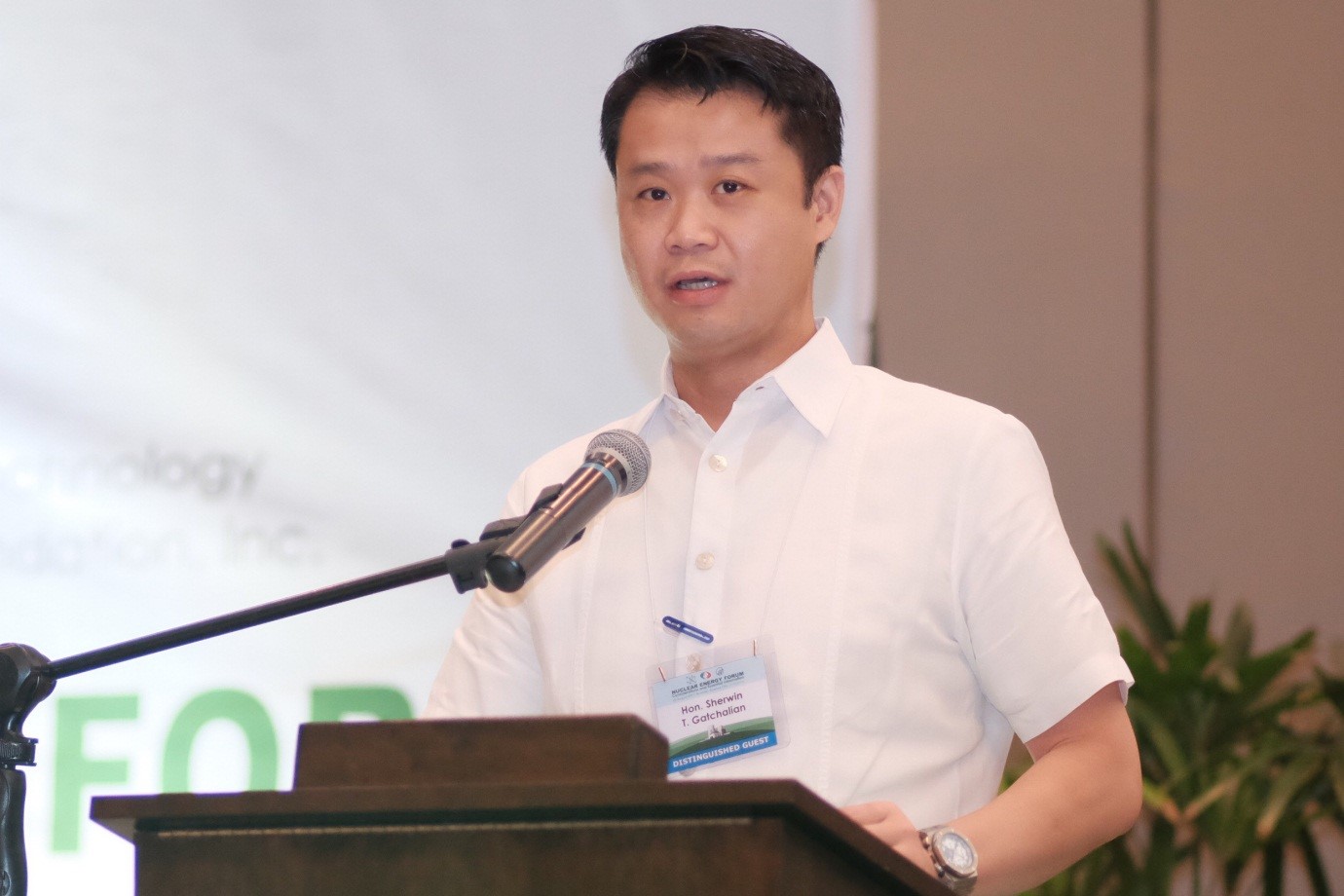 Sen. Sherwin T. Gatchalian discussing the role of policies legislative branch of government in advancing nuclear energy.
Sen. Sherwin T. Gatchalian discussing the role of policies legislative branch of government in advancing nuclear energy.
Senator Sherwin T. Gatchalian who serves as the Chairperson of the Senate Committee on Energy shared the importance of legislation and the key responsibility of the Senate in advancing the pursuit of nuclear energy such as providing policy direction, laying down legislative framework, ensuring policy consistency, having check and balance, providing appropriations, and following international commitments.
In his presentation, Sen. Gatchalian reported that as early as 1957 the Philippines enacted national policies on nuclear energy including the Republic Act No. 1815 which created the Philippine Atomic Energy Commission in 1957, which also led to the establishment of the Philippine Nuclear Research Institute (PNRI) by the virtue of Executive Order No. 128, series of 1987.
Sen. Gatchalian discussed that the Philippine existing policies on nuclear energy lack cohesive policy direction, no specialized agency, no regulator, lack of manpower, and lack of research and development when compared to international standard. He further stressed out that the necessary legislative measures must focus on regulator (having a single organization), radiation protection, safety of nuclear facilities and decommissioning, emergency preparedness and response, processing of radioactive material, transport of radioactive material, radioactive waste and spent fuel, nuclear liability and coverage, safeguards, export and import controls, and nuclear security. He shared that South Korea and France have enacted 16 and 18 nuclear energy related laws, respectively, which govern their nuclear energy programs.
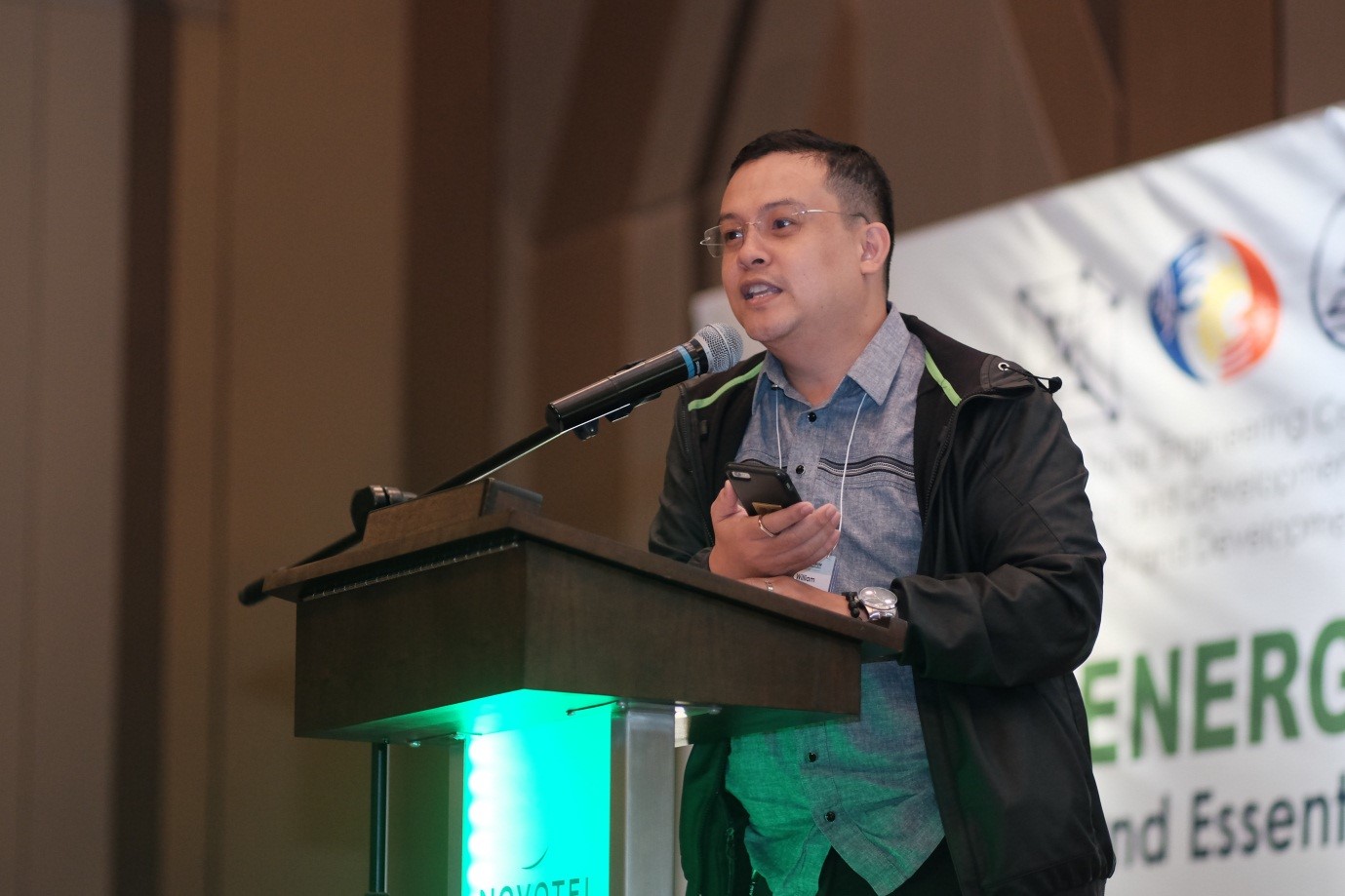 DOE Usec. Felix William B. Fuentebella reporting the Philippine Power Development Plan.
DOE Usec. Felix William B. Fuentebella reporting the Philippine Power Development Plan.
In his presentation titled “Philippine Power Development Plan and Status of Renewable and Fossil-Based Power Sources”, DOE Undersecretary Felix William B. Fuentebella showed the recently formulated Philippine Power Development Plan 2016-2040. The Plan is in line with National Economic and Development Authority’s Ambisyon Nation 2040 and envisages the shaping and redefining of the country’s electric power industry. It contains the Philippines’ electricity profile, performance assessment for 2011-2015, demand and supply outlook for 2016-2040, and the power sector’s roadmap.
The Philippines installed generating capacity and power mix show diversity in plant types and fuel sources utilized in electricity generation. In 2016, the total installed capacity reached 21,424 MW with fossil-based comprising 67.5 percent and renewables accounting for 32.5 percent. Gross power generation in 2016 was recorded at 90,797 Gigawatt-hours (GWh) with fossil fuels having a share of 75.8 percent and renewables at 24.2 percent.
The Philippines will need 43,765 MW additional capacity by 2040. To attain this, DOE adopted its Nine-Point Energy Agenda which focuses on two areas namely the adoption of a technology neutral approach for an optimal energy mix of 70 percent baseload, 20 percent mid-merit and 10 percent peaking and improvement of the power supply which institutionalizes a 25 percent reserve requirement.
The Forum’s technical sessions were led by international speakers, invited for the purpose through the funding of DOST-ERDT and efforts of DOST-PNRI and UP NEC.
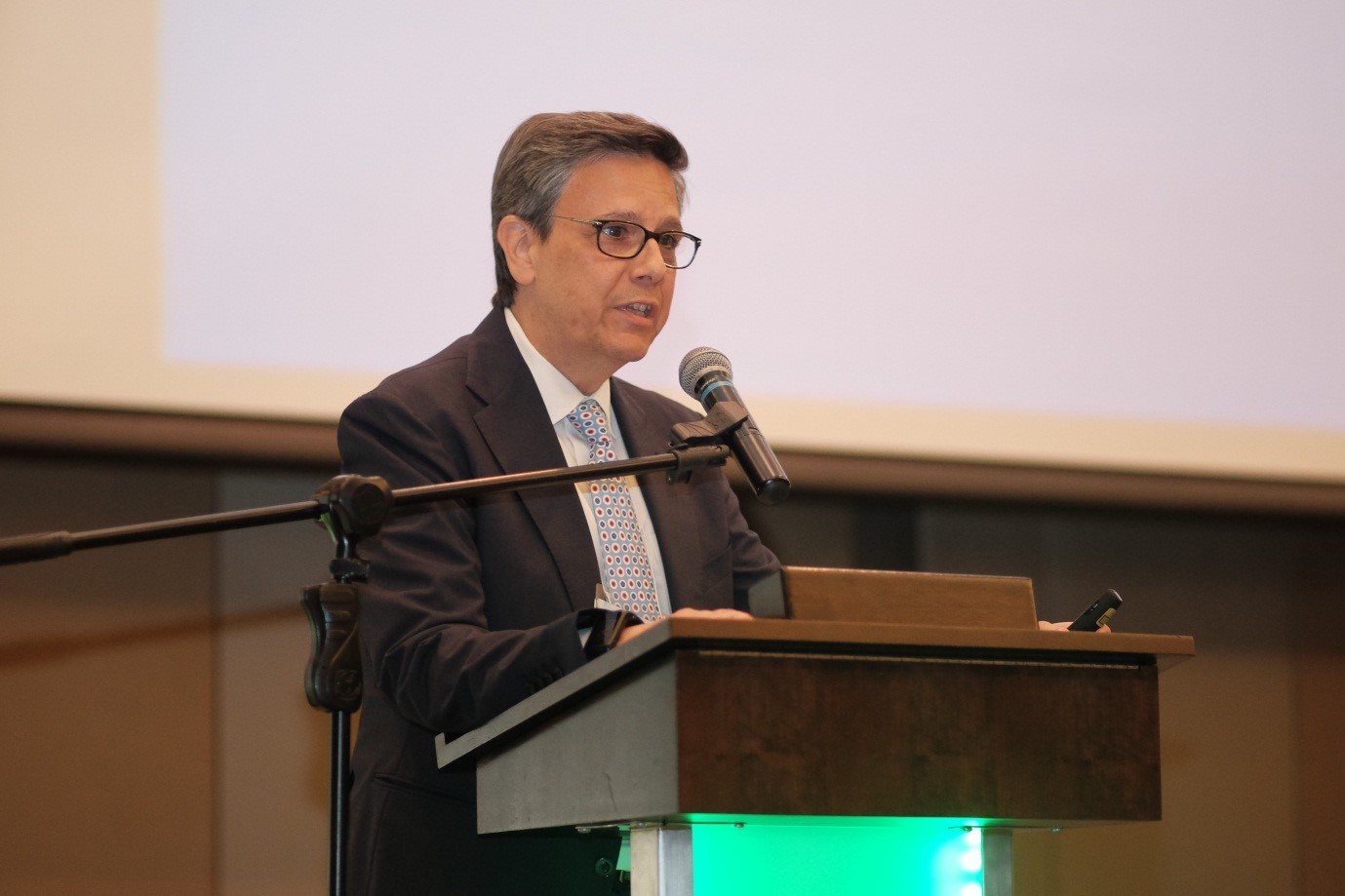 IAEA Representative Dr. José Bastos presenting support on infrastructure development for new nuclear policy programs.
IAEA Representative Dr. José Bastos presenting support on infrastructure development for new nuclear policy programs.
The International Atomic Energy Agency (IAEA) representative Dr. José Bastos highlighted that launching a nuclear energy program involves 10-15 years of preparatory work and a commitment for around 100 years. Given this, he emphasized the crucial roles of strong institutions especially regulatory institution and legal framework for nuclear resource use in the country.
Mr. Bastos also cited the assistance that IAEA can provide to countries that are considering nuclear energy through the Milestones Approach, an internationally accepted method which enables a country to understand the commitments and obligations associated with developing a safe, secure, and sustainable nuclear power program. The first Milestone consists of addressing 19 infrastructure issues which he briefly presented. He noted that most of the deficiencies in the early phases of the first Milestone were noted in the infrastructure issues of National Position, Management, Legal Framework, Regulatory Framework and Human Resources Development. He discussed IAEA Integrated Nuclear Infrastructure Reviews (INIR) missions in 22 countries from 2009-2016. In particular, he noted the INIR process for the Philippines. Since mid-2016, the DOE has undertaken several workshops in the Philippines with speakers/panelists provided by IAEA. It has also sent representatives to other countries for knowledge-gaining trips endorsed by IAEA.
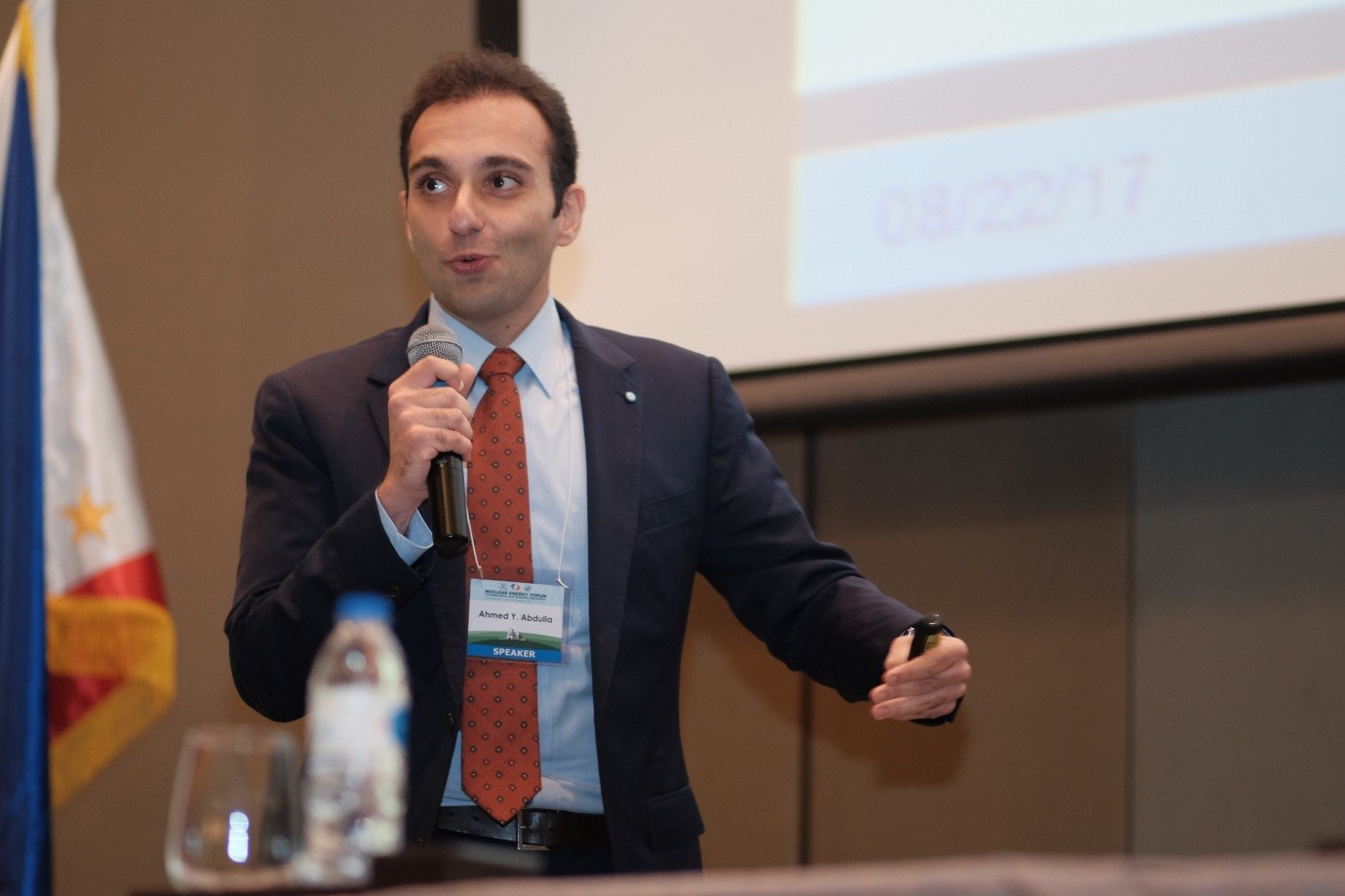 Assistant Professor Dr. Ahmed Y. Abdulla discussing the current global nuclear enterprise landscape and State of Nuclear Enterprise in the United States.
Assistant Professor Dr. Ahmed Y. Abdulla discussing the current global nuclear enterprise landscape and State of Nuclear Enterprise in the United States.
Dr. Ahmed Y. Abdulla, Assistant Professor at Carnegie Mellon University in the USA talked about the current global nuclear enterprise landscape with focus on South Korea, Japan, France, Russia, China, and United States of America. He started his talk with the urgent global challenge of deep decarbonization and the role that nuclear energy might play. He, however, warned the participants against the wishful notions regarding the benefits of nuclear. He gave a grounding picture of the opportunities and challenges of the different countries as he talked about the available technologies, emphasizing that this is still a light water reactor world. He suggested that the Philippines should clarify first its strategic priorities. He also shared the thoughts of Dr. Bastos on the primary importance of strong institutions. Together with his colleagues, he found that most big problems are more institutional than technical. He further added that the inclusion of institutional factors can determine the overall performance of the nuclear plants in each country.
In the afternoon, Dr. Abdulla discussed the challenges of nuclear enterprise in the United States, namely high capital cost, waste management, safety of reactor operators and proliferation of nuclear materials. The light water small modular reactors are getting more popular while large water reactors are not being deployed. U.S designed advanced, non-water light reactors are not being developed which might require the US utilities to buy these reactors from China, Russia, or S. Korea. R&D on nuclear energy has been very small with USDOE budget on advanced fission reactors is only 19% of the total budget. Public perception on nuclear power plants has been negative because of disaster potential, connection to weapons and lack of faith in risk communicators.
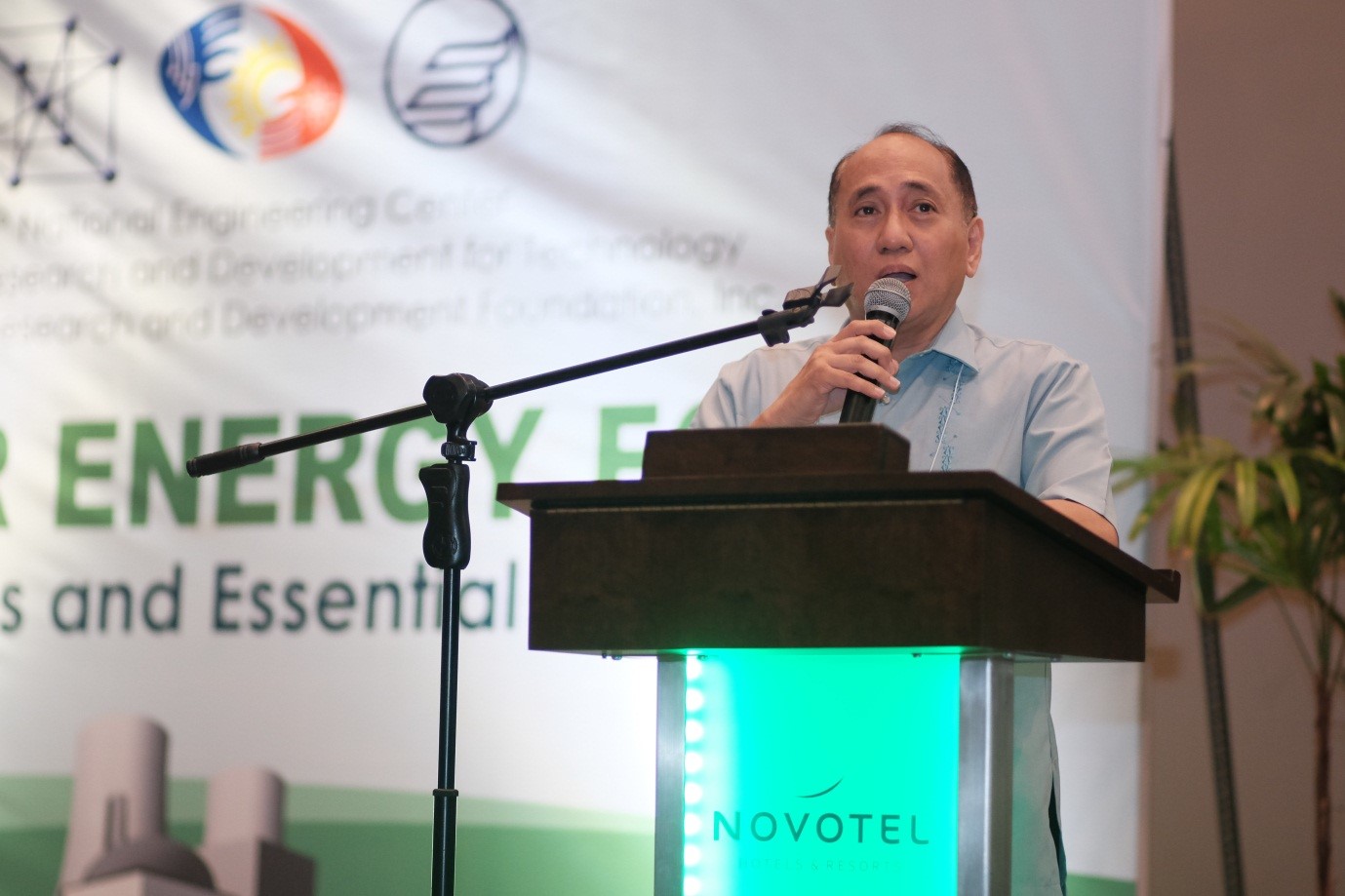 DOST-PNRI Chief Teofilo V. Leonin talking about the various applications of nuclear energy in food and agriculture, health and medicine, and environment.
DOST-PNRI Chief Teofilo V. Leonin talking about the various applications of nuclear energy in food and agriculture, health and medicine, and environment.
Mr. Teofilo V. Leonin, Jr., Chief of PNRI Nuclear Regulatory Division enlightened the participants on the Philippine Legislative and Regulatory Infrastructure for Nuclear and Radiation Safety. He discussed that the Philippines has two regulatory bodies that control and regulate all sources of ionizing radiation to ensure safety and protection of people and the environment from the danger of ionizing radiation. These regulatory bodies are the DOST-PNRI for radioactive materials and atomic energy facilities and the Department of Health, Food and Drug Administration and Center for Device Regulation, Radiation Healthy, and Research) for devices and facilities that electrically generate ionizing radiation.
He also mentioned other applications of nuclear energy in the fields of Food and Agriculture such as in mutating breeds of rice and other alternative crops for resilience to combat impacts of climate change, Health and Medicine like producing radiation-modified natural products (e.g., carrageenan, alginate, and honey), and the Environment such as the use of nuclear spectrometric techniques for identification and source apportionment of air pollutants, marine and coastal pollution and other environmental studies.
In pursuit of a stronger regulatory institution, Mr. Leonin updated the participants that there is a pending bill in the 17th Congress known as “Comprehensive Nuclear Regulation Act” which aims to (1) create a single, independent nuclear regulatory body that is focused in the control and regulation of the peaceful uses and application of ionizing radiation and nuclear energy in the country and (2) to exercise authority over all aspects of safety, security and safeguards involving nuclear materials and other radioactive materials, facilities and radiation generation equipment.
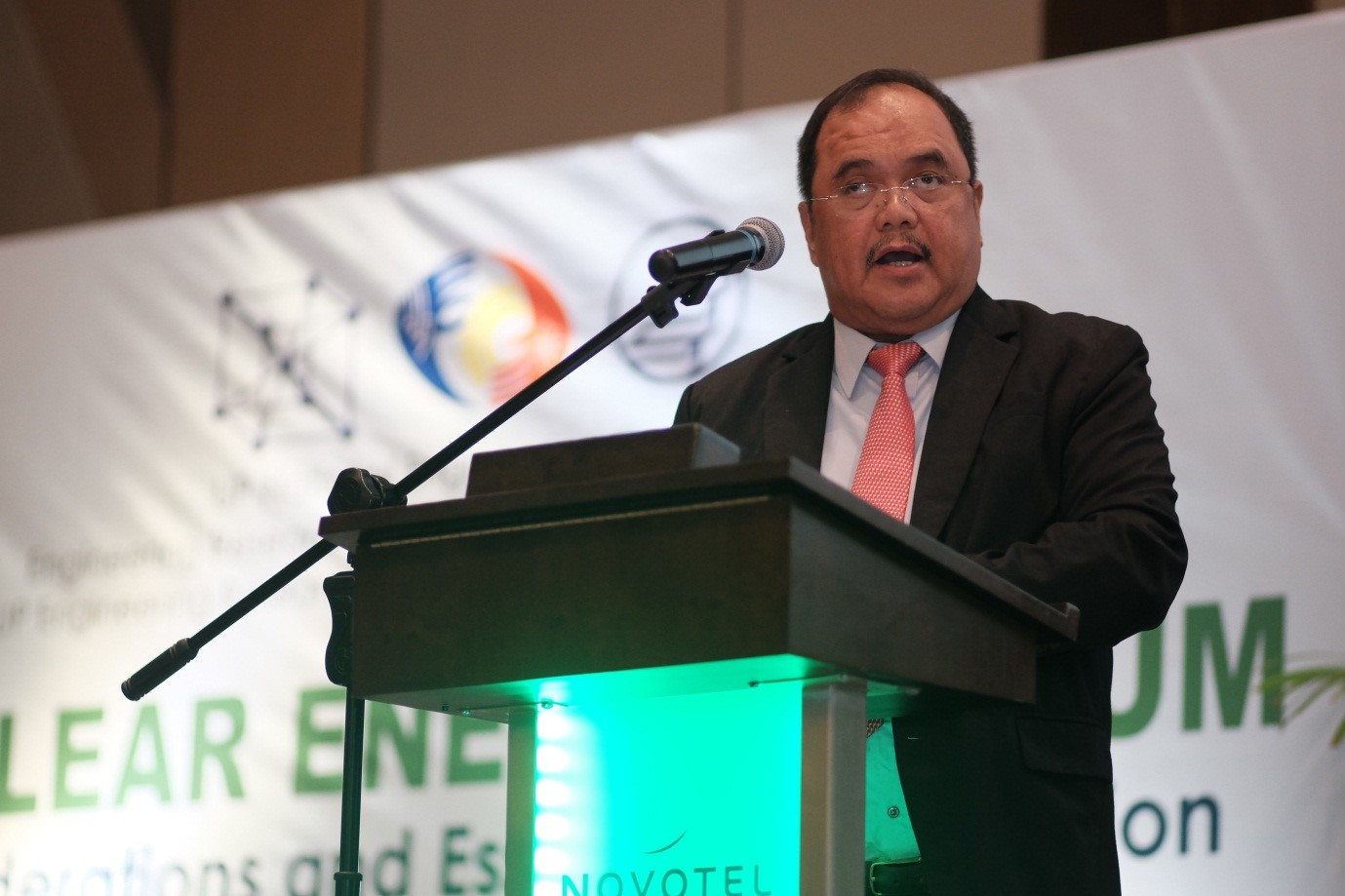 DOE Usec. Donato D. Marcos informing the participants on the main tasks of NEPIO.
DOE Usec. Donato D. Marcos informing the participants on the main tasks of NEPIO.
The afternoon session catered to country-specific knowledge, expertise and experiences. DOE Undersecretary. Marcos discussed the creation of the Nuclear Energy Program Implementing Organization or NEPIO with the main task of conducting research and studies to inform and formulate a recommendation on a national position on nuclear power. “While the use of nuclear energy is still a contentious issue due to public concerns on radioactive waste disposal, safety of power plant operation, social acceptability and the need for political will, NEPIO leads in the unified and coordinated efforts and activities relative to the conduct of various studies and research on increase awareness and appreciation of nuclear energy development in the country. The most pressing and immediate task of the NEPIO is to submit to the Office of the President by December 2017 a National Position on nuclear energy based on a thorough inventory and assessment of facts and researches.”
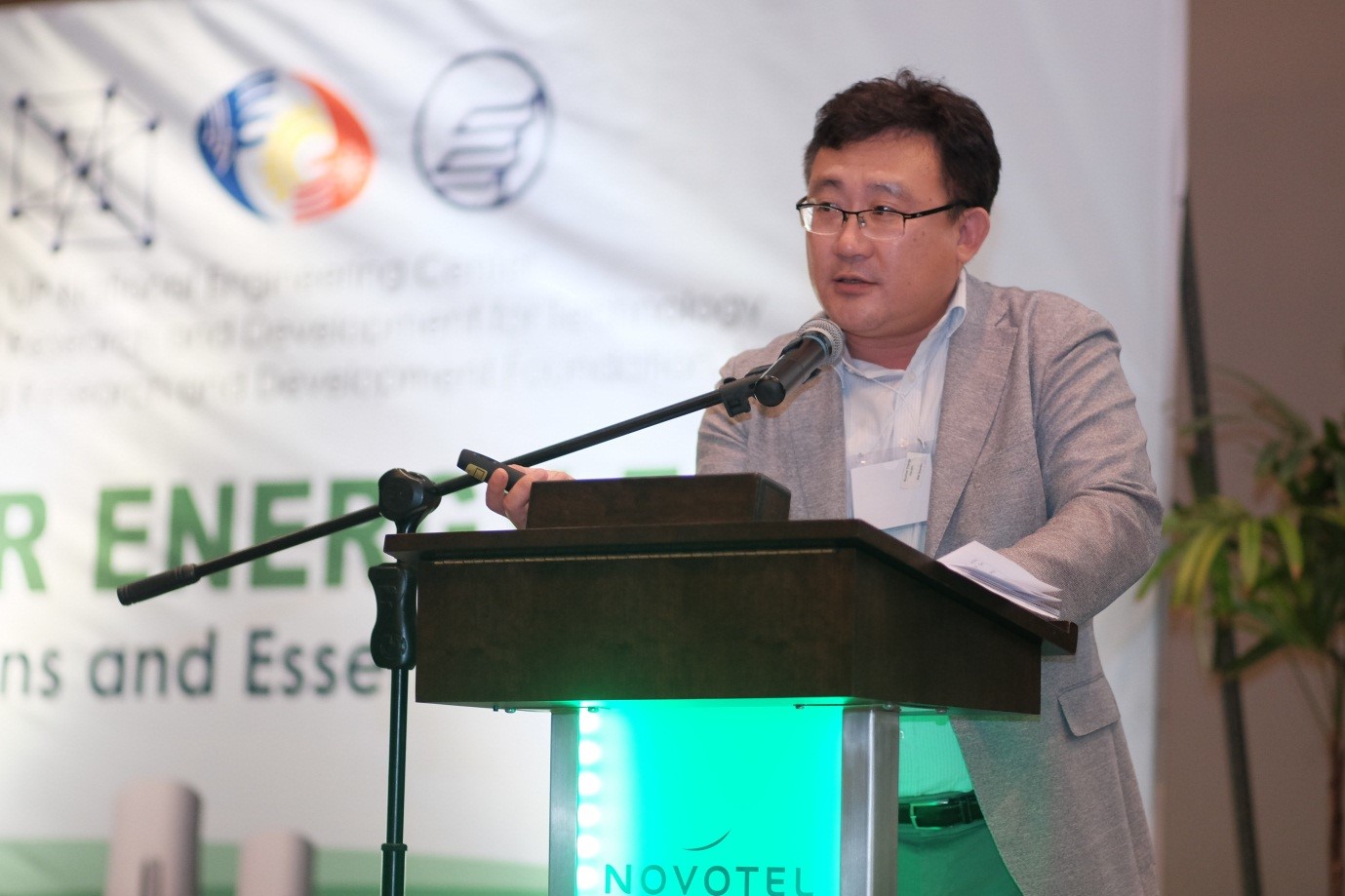 KHNP General Manager Mr. Jeong Kwang-Hee sharing the experience of South Korea in constructing nuclear power plants.
KHNP General Manager Mr. Jeong Kwang-Hee sharing the experience of South Korea in constructing nuclear power plants.
Mr. Jeong Kwang-Hee, General Manager at Korea Hydro and Nuclear Power Co., Ltd. (KHNP) talked about the technologies they have and their experience in constructing nuclear power plants. KHNP is an Engineering, Procurement and Construction (EPC) company of nuclear power plants in South Korea and overseas. South Korea has 30% of gross electricity generation or 22,529 MW from nuclear. It is the most affordable electricity at 39.6 KRW/Kwh versus the most expensive - solar at 316.8 KRW/kwh. According to Mr. Jeong, Koreans were able to localize their supply chain and have developed the capability to export all the elements needed to build and operate a nuclear power plant. Education and training of operational personnel are also important component to ensure safe and efficient operation. KHNP has developed technologies to address the problems of accidents, hazards, seismic, waterproofing etc. that occurred at TMI in 1979, Chernobyl in 1986 and Fukushima in 2011. KHNP has also developed Technology and Procedures for decommissioning starting with Kori 1 built in 1970s. Note that Kori 2 is the sister plant to the Bataan (Philippine), Angre (Brazil), and KRSKO (Slovenia) nuclear power plants.
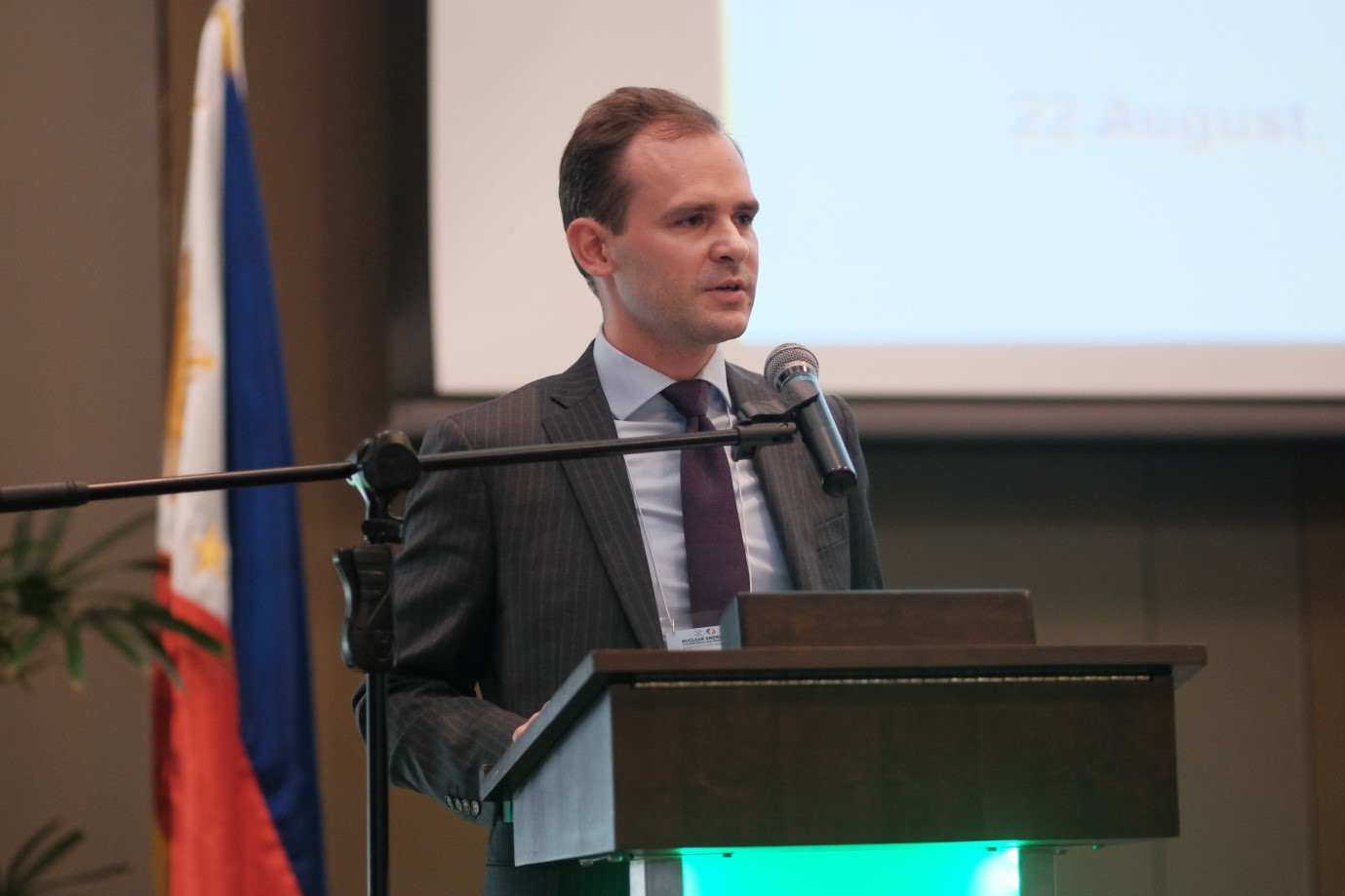 Rosatom Vice President Mr. Anton V. Moskvin discussing the experience of Russia on nuclear energy.
Rosatom Vice President Mr. Anton V. Moskvin discussing the experience of Russia on nuclear energy.
Mr. Anton V. Moskvin, Vice President for Marketing and Business Department of Rosatom Overseas talked about the different technologies available in Russia and their experiences on dealing with contracting nuclear power plant projects. Rosatom operates Russia’s 18.5% .power generation from nuclear and extracts 13% of global uranium. It offers expertise in IAEA’s 19 infrastructure issues and considers public acceptance important starting with public perception survey, development and implementation of communication program. Human resource development and local industry involvement are also critical in its approach. Rosatom provides technology on Small Modular Reactor for on and off-shore applications. Its Floating Nuclear Power Plant with a life cycle of 40-60 years is designed to supply electricity, thermal power and desalinated water.
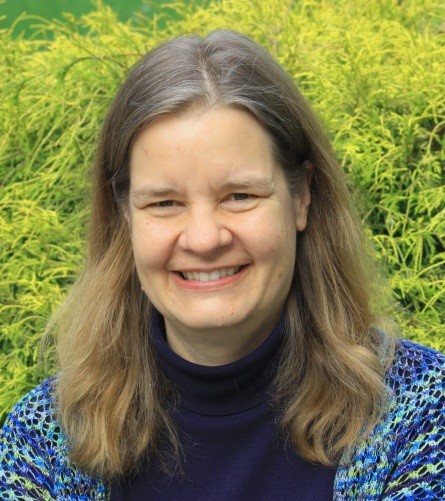 Prof. Dr. Miranda A. Schreurs
Prof. Dr. Miranda A. Schreurs
Dr. Miranda A. Schreurs, Professor at the Technical University of Munich narrated by live broadcast from Munich the progression of policy on nuclear power and renewable energy in Germany through her presentation titled “Imagining the Future while Dealing with the Past: Germany‘s Efforts to Deal with its High Level Radioactive Waste”. Germany is busy decommissioning its nuclear power plants.
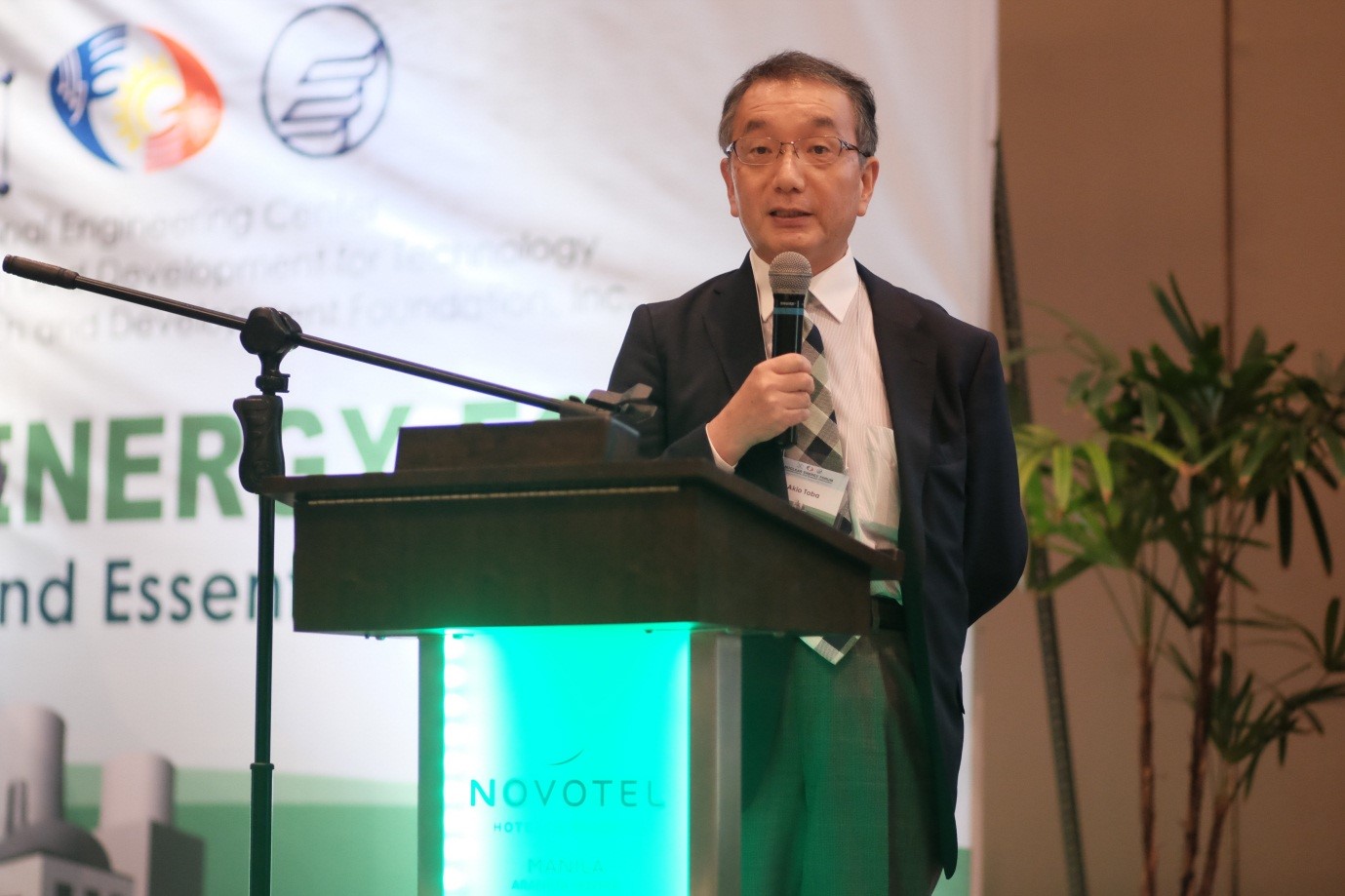 JAIF Executive Director Mr. Akio Toba providing the lessons learned from the Fukushima Daiichi nuclear accident.
JAIF Executive Director Mr. Akio Toba providing the lessons learned from the Fukushima Daiichi nuclear accident.
Mr. Akio Toba, Executive Director of JAIF (Japan Atomic Industrial Forum, Inc.) International Cooperation Center shared the enhancements and other developments on Nuclear Safety and Emergency Planning in Japan based on the lessons learned from the Fukushima Daiichi nuclear accident in 2011. Because of the tsunami caused by the magnitude 9 earthquake in March 2011, flooding in the first floor and damage at the yard seawater pump station occurred at the Fukushima Daiichi. Consequently, the Japanese government changed the nuclear regulatory requirements and the National Nuclear Disaster Prevention Guide based on the lessons learned on nuclear safety in the plant and emergency preparedness of the plant, government and community. Nevertheless, Japan continues its efforts on non-proliferation and security capacity building in Asian countries. Fukushima Daiichi is now stabilized and is proceeding with complete decommissioning. Japanese utilities have complied with new regulations based on the lessons learned and should be able to restart their plants. Government of Japan has acknowledged that nuclear power is an important base-load power source that is low carbon and quasi-domestic source and contributes to the stability of the supply-demand structure.
The issue of committing to nuclear power requires consideration of multifarious factors and that the immense scope and complexity of this topic must be appreciated not just by key decision makers but more importantly, the public.
Dr. Mili-Ann M. Tamayao, UP NEC Deputy Executive Director gave a summary of all the presentations and shared her learning. “My biggest take away not just from today's talks but also our own experience with Bataan Nuclear Power Plant is definitely that the issue of committing to nuclear power requires consideration of multifarious factors and that the immense scope and complexity of this topic must be appreciated not just by key decision makers but more importantly, by the public. A decision to go nuclear goes beyond the three milestones which must be hurdled within 11-20 years. It also includes over 100,000 years of managing the spent fuel waste. Thus, the commitment must withstand time and political eras. In a democratic country like ours, this can only be done when people are informed and actively engaged in the decision process, so that succeeding generations are committed to make things work.”
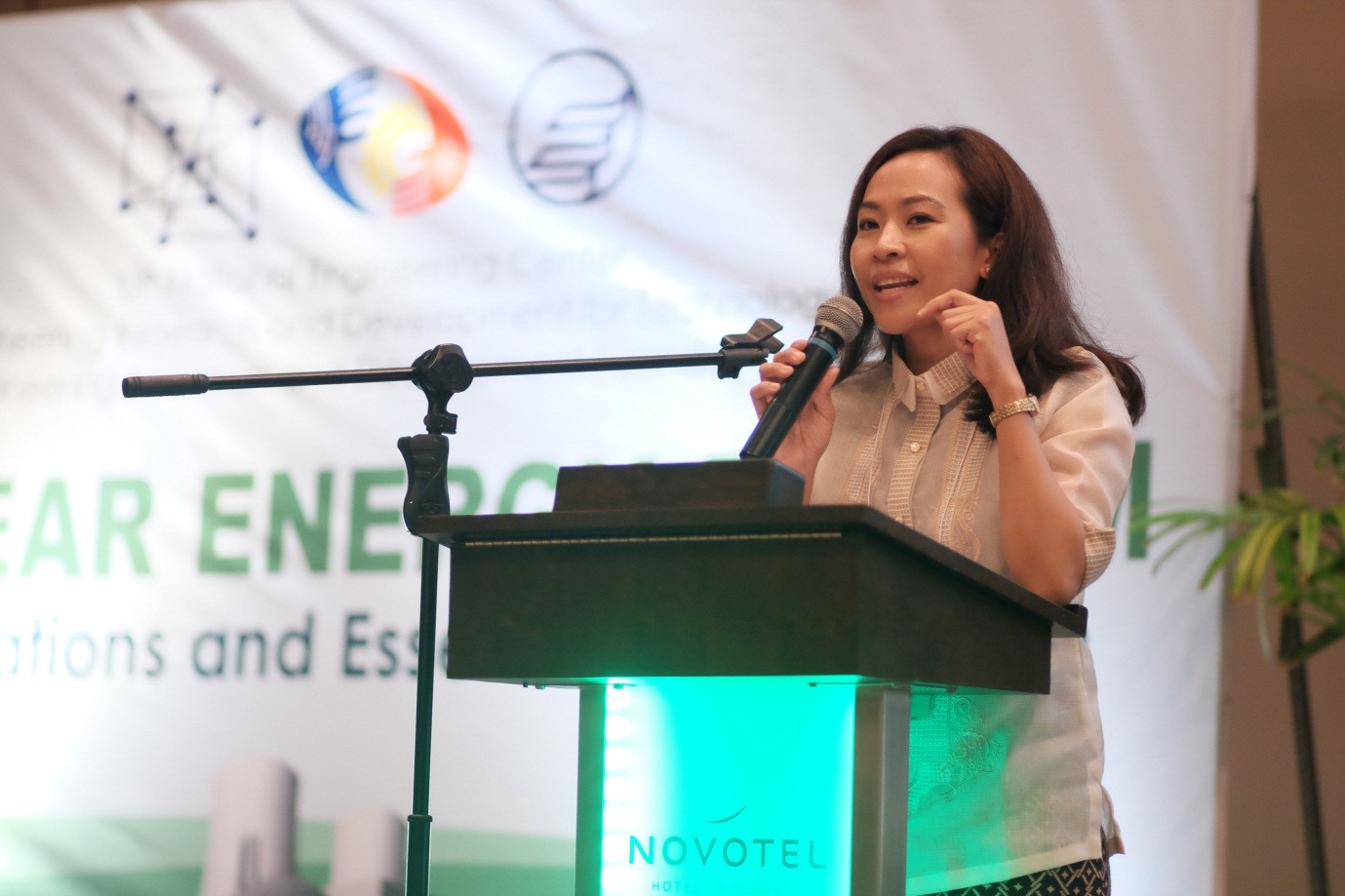 NEC Deputy Executive Director Dr. Mili-Ann M. Tamayao delivering her synthesis and key learning points.
NEC Deputy Executive Director Dr. Mili-Ann M. Tamayao delivering her synthesis and key learning points.
A number of questions were raised by the participants during the open fora ranging from the rehabilitation of BNPP or the creation of a new plant and its strategic location; the readiness of the Philippines for a nuclear energy program; environmental impact of nuclear plants; waste management; concrete plans for stakeholders’ awareness, appreciation, understanding and involvement; competencies for manpower who will run the plant; to sustaining nuclear energy policies given the changing political landscape in the Philippines. Dr. Allan C. Nerves of UP Diliman, Dr. Rinlee Butch M. Cervera of UP Diliman, and Dr. Alvin B. Culaba of De La Salle University served as moderators during these segments.
Dr. Joseph Gerard T. Reyes and Dr. Leslie Joy L. Diaz, faculty members from UP Diliman hosted the event.
Engr. Pedro H. Maniego, Jr., UPERDFI Chairman and former chairman of the National Renewable Energy Board, officially closed the event and thanked all the participants, organizers, and partners. He cited the organizing committee led by Engr. Rosario S. Calderon, UPERDFI Vice President and Principal at Green Global Ideas, and the support from DOST Undersecretary Rowena Guevara, DOST-PNRI Nydia Medina and Vangelina Parami, and DOE Assistant Secretary Gerardo D. Erquiza Jr for all their efforts, starting from the time the forum was conceived in November 2016.
The Role of the Senate in the Pursuit of Nuclear Energy Policy in the Philippines
Hon. Sherwin T. Gatchalian
Senator and Chairperson
Senate of the Philippines Committee on Energy
Power Development Plan and Status of Renewable and Fossil-Based Power Sources
Usec. Felix William B. Fuentebella
Department of Energy
IAEA Support on Infrastructure Development for a New Nuclear Power Programme
Dr. Jose Bastos
Nuclear Power Infrastructure Development Section
International Atomic Energy Agency
Nuclear Technology and Policy across the Globe
Dr. Ahmed Y. Abdulla
Post-doctoral Fellow, University of California San Diego
Assistant Professor, Carnegie Mellon University
The Philippine Legislative and Regulatory Infrastructure for Nuclear and Radiation Safety
Chief Teofilo V. Leonin, Jr.
Nuclear Regulatory Division
DOST Philippine Nuclear Research Institute
Nuclear Energy Program Implementing Organization (NEPIO) and Philippine Government Plan for Nuclear Policy
Usec. Donato D. Marcos
Chairman, NEPIO
Department of Energy
NPP Construction/Operation and Nuclear Technology Development: Experience from South Korea
Mr. Jeong, Kwang-Hee
General Manager, Global Nuclear Business Department
Korea Hydro and Nuclear Power Co., Ltd.
Rosatom Integrated Approach to Nuclear Energy Development
Mr. Anton V. Moskvin
Vice President for Marketing and Business Development
Rosatom Overseas
Imagining the Future while Dealing with the Past: Germany‘s Efforts to Deal with its High Level Radioactive Waste
Dr. Miranda A. Schreurs
Professor, Environment and Climate Polciy
Bavarian School of Public Policy
Technical University of Munich
Nuclear Safety, Emergency Planning, Safeguards and Security and Physical Protection: Japanese Experience
Mr. Akio Toba
Executive Director
JAIF (Japan Atomic Industrial Forum, Inc.) International Cooperation Center
The State of the American Nuclear Enterprise in 2017
Dr. Ahmed Y. Abdulla
Post-doctoral Fellow, University of California San Diego
Assistant Professor, Carnegie Mellon University
To know more about AEESEAP, you may visit
www.aeeseap.com


